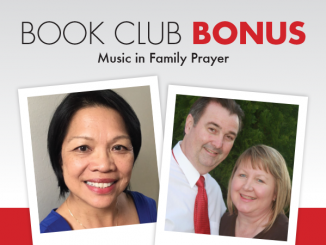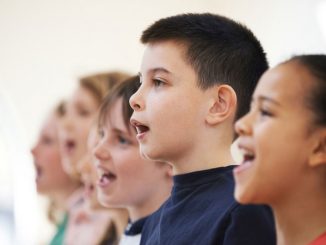
If you’ve ever questioned the significance of music when it comes to our faith, consider the fact that, right before the halfway point of our Bible, you will find a hymnal—the Book of Psalms! Although we do not have the original melodies of these song-prayers, we do know that they were put to music and used in Temple worship. In addition to the presence of a hymnal in our Bible, also know that music appears in the first and last books of the Bible. Genesis 4:21 tells us that one of Adam’s grandsons was named Jubal (a name which means horn, from which we get the word jubilee), and he was considered the ancestor of all who play the lyre and pipe. Not to be outdone, the Book of Revelation (11:5) tells us that it is the sound of a trumpet that signals the end of the world, and the Church will go forth into eternity singing a victory song (19:5–10). In between the first and last books of the Bible, the word sing appears well over 200 times (depending on which translation you’re using).
Thus, it is no surprise that the Church tells us that “One cannot find anything more religious and more joyful in sacred celebrations than a whole congregation expressing its faith and devotion in song. Therefore the active participation of the whole people, which is shown in singing, is to be carefully promoted…” (Musicam Sacram: Instruction on Music in the Liturgy, 16, Sacred Congregation of Rites) One crucial place where this should be carefully promoted is in faith formation. Many of those we teach are musically inclined. In fact, music and singing are included as one of Dr. Howard Gardner’s multiple intelligences. Learners with musical intelligence are very tuned in (pun intended) to rhythm, pitch, tone, and melody. They often can learn and memorize concepts when taught via song. They are very auditory and enjoy humming, whistling, and tapping their feet or clapping their hands. Many such learners are adept at playing musical instruments.
I have blogged before about the importance of music and singing in catechesis and have made my playlist available so that you can start your own library of go-to-hymns. Likewise, I have often talked about the beautiful music CDs that are a part of the Finding God program as well as our God’s Gift sacramental preparation program and Christ Our Life. Here are a few more ideas for how to engage musical learners:
- Use chants to teach concepts organized in lists.
- Read out loud and/or do choral reading.
- Create rhythm by clapping or tapping feet to accompany concepts being taught.
- Use rhymes to teach concepts and/or have the children create rhymes to learn concepts.
- Play instrumental music while children complete tasks.
- Fluctuate or modulate the tone of your voice as you teach.
- Find music and songs to sing or play that relate to the theme of your lesson.
- Be patient with the children’s constant tapping, drumming, humming, or whistling.
What other strategies have worked for you in engaging learners with musical intelligence?





I will continue to express my gratitude to God,who directed me to discover this blogg,it is helping me alot in my personal life and my work as a Chief catechist.But I need more,so that I can impact meaningfully.Thank you.
Thanks, Iwuoha! May you continue to make a meaningful impact on those you teach!